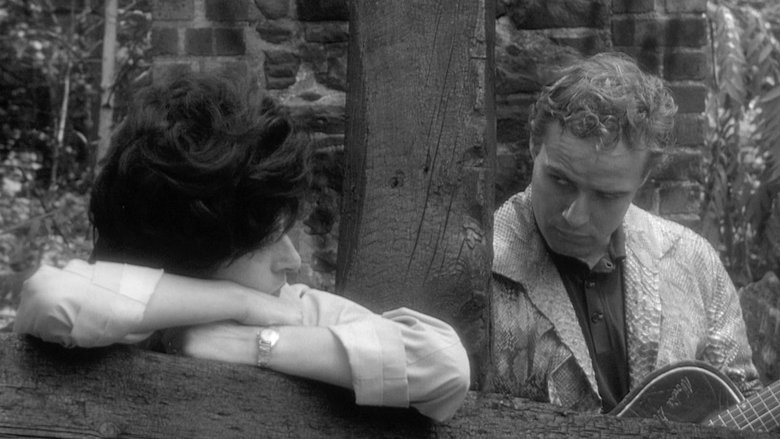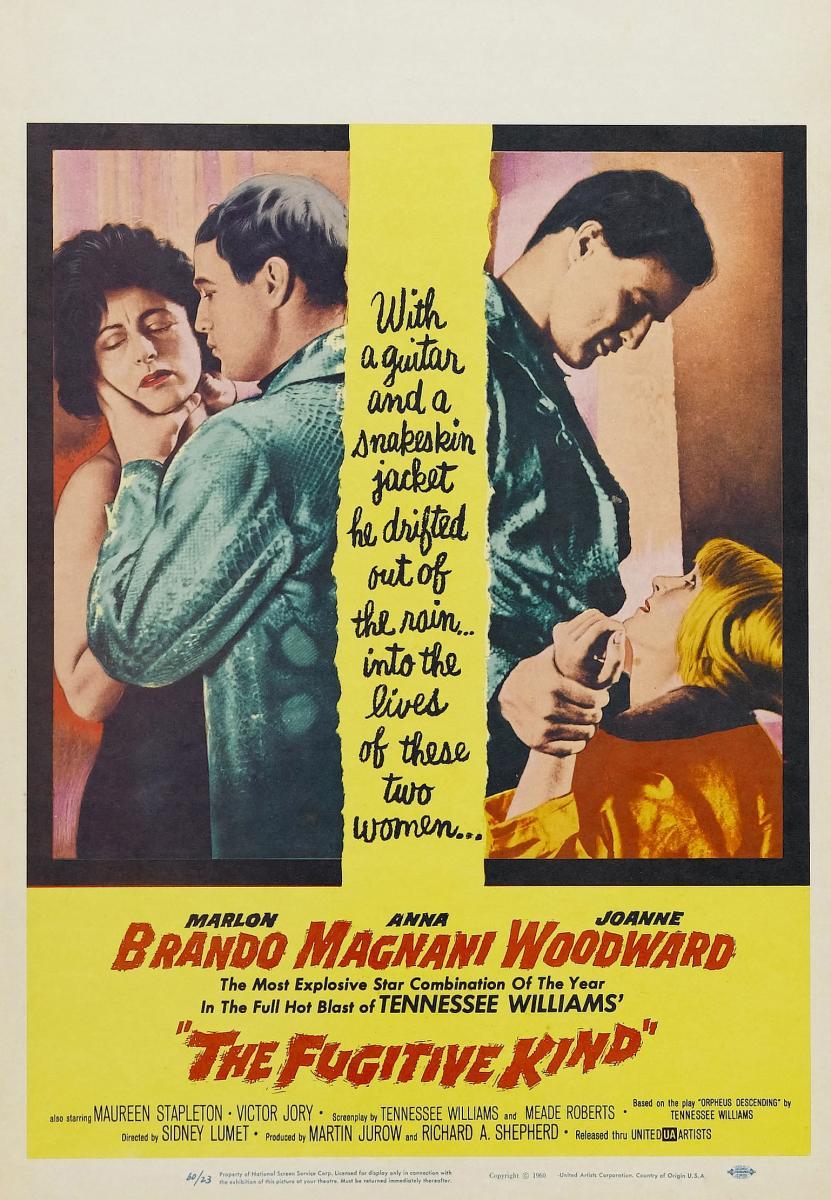← Back to Reviews

in
The Fugitive Kind
Though definitely a lesser work of its director and its screenwriter, 1960's The Fugitive Kind is still appointment viewing thanks to the three extraordinary performances by Oscar winners in the starring roles, more than making up for the film's minor deficiencies.

Marlon Brando, once again, commands the screen as Valentine Xavier, AKA "Snakeskin", a guitar player and drifter who always seems to be followed by some kind of trouble, gets out of jail and tries to start over in a sleepy southern town, but finds that nearly impossible thanks to the sexual heat he creates with three very different women with their own individual baggage. Vee Talbot (Maureen Stapleton) is a lonely housewife willing to look past Snakeskin's sexual bravado; Carol (Joanne Woodward) is the town tramp who throws herself at Snakeskin to no avail; Lady Torrance (Anna Magnani) is a hot-blooded Italian shopkeeper trapped in an unhappy marriage to an abusive and seriously ill psycho.

This film is based on a lesser work by Tennessee Williams called Orpheus Descending that had a very brief Broadway run featuring Cliff Robertson as Snakeskin, Stapleton as Lady Torrance, and Lois Smith as Carol. It's curious that after a mere 68 performances on Broadway that it got fast-tracked to the screen. It's definitely one of Williams' more talky pieces, but talky is a Williams staple that is easy to forgive. It's the adult themes pervading this film that makes one wonder how it got to the screen so quickly and what concessions did Williams have to make for it happen. His screen adaptation with Meade Roberts could have been more economic, but there's a lot of stuff that got onscreen here that surprised me. Hollywood apparently had come a long way since A Streetcar Named Desire, the last film filled with such sexual heat and gritty intensity.

One of my favorite directors, Sidney Lumet, does an admirable job of establishing the sweaty, sexy atmosphere but could have given the story a little more forward motion. What he does give us in is three indescribable, Oscar-worthy lead performances that gave this piece what was missing on Broadway. Once again, Brando delivers another electric sex performance in a character very reminiscent of his Johnny in The Wild One, but in this film we see the man's effect on three different women in different ways. Stapleton's Vee doesn't really see her attraction to the man; Woodward's Carol becomes obsessed to no avail and Magnani's Lady fights it until she can't fight it anymore.

Joanne Woodward, in a serious case of casting against type, chews the scenery as the town tramp unlike anything I have ever seen from her. Her performance completely overpowers the cliched aspects of her character and demands viewer attention. Mention should also be mentioned of a bone chilling turn from Victor Jory as Lady's nutso husband, but if the truth be told, it's Magnani who really keeps this film on sizzle. Magnani won the Oscar for Best Actress five years earlier for The Rose Tattoo and after watching her here, I really want to see The Rose Tattoo now...Magnani is all smoldering sensuality and angry intensity here, in a performance that just might rival Vivien Leigh in Streetcar, a performance of robust strength and fragility that seam perfectly.

Boris Kaufman's stunning black and white cinematography and Richard Sylbert's art direction deserve shout outs too, but this movie is owned by Brando, Woodward, and the one and only Anna Magnani. Bravo. The movie was remade in 2010 for TV as "Orpheus Descending" with Kevin Anderson as Snakeskin and Vanessa Redgrave as Lady.
Though definitely a lesser work of its director and its screenwriter, 1960's The Fugitive Kind is still appointment viewing thanks to the three extraordinary performances by Oscar winners in the starring roles, more than making up for the film's minor deficiencies.

Marlon Brando, once again, commands the screen as Valentine Xavier, AKA "Snakeskin", a guitar player and drifter who always seems to be followed by some kind of trouble, gets out of jail and tries to start over in a sleepy southern town, but finds that nearly impossible thanks to the sexual heat he creates with three very different women with their own individual baggage. Vee Talbot (Maureen Stapleton) is a lonely housewife willing to look past Snakeskin's sexual bravado; Carol (Joanne Woodward) is the town tramp who throws herself at Snakeskin to no avail; Lady Torrance (Anna Magnani) is a hot-blooded Italian shopkeeper trapped in an unhappy marriage to an abusive and seriously ill psycho.

This film is based on a lesser work by Tennessee Williams called Orpheus Descending that had a very brief Broadway run featuring Cliff Robertson as Snakeskin, Stapleton as Lady Torrance, and Lois Smith as Carol. It's curious that after a mere 68 performances on Broadway that it got fast-tracked to the screen. It's definitely one of Williams' more talky pieces, but talky is a Williams staple that is easy to forgive. It's the adult themes pervading this film that makes one wonder how it got to the screen so quickly and what concessions did Williams have to make for it happen. His screen adaptation with Meade Roberts could have been more economic, but there's a lot of stuff that got onscreen here that surprised me. Hollywood apparently had come a long way since A Streetcar Named Desire, the last film filled with such sexual heat and gritty intensity.

One of my favorite directors, Sidney Lumet, does an admirable job of establishing the sweaty, sexy atmosphere but could have given the story a little more forward motion. What he does give us in is three indescribable, Oscar-worthy lead performances that gave this piece what was missing on Broadway. Once again, Brando delivers another electric sex performance in a character very reminiscent of his Johnny in The Wild One, but in this film we see the man's effect on three different women in different ways. Stapleton's Vee doesn't really see her attraction to the man; Woodward's Carol becomes obsessed to no avail and Magnani's Lady fights it until she can't fight it anymore.

Joanne Woodward, in a serious case of casting against type, chews the scenery as the town tramp unlike anything I have ever seen from her. Her performance completely overpowers the cliched aspects of her character and demands viewer attention. Mention should also be mentioned of a bone chilling turn from Victor Jory as Lady's nutso husband, but if the truth be told, it's Magnani who really keeps this film on sizzle. Magnani won the Oscar for Best Actress five years earlier for The Rose Tattoo and after watching her here, I really want to see The Rose Tattoo now...Magnani is all smoldering sensuality and angry intensity here, in a performance that just might rival Vivien Leigh in Streetcar, a performance of robust strength and fragility that seam perfectly.

Boris Kaufman's stunning black and white cinematography and Richard Sylbert's art direction deserve shout outs too, but this movie is owned by Brando, Woodward, and the one and only Anna Magnani. Bravo. The movie was remade in 2010 for TV as "Orpheus Descending" with Kevin Anderson as Snakeskin and Vanessa Redgrave as Lady.
